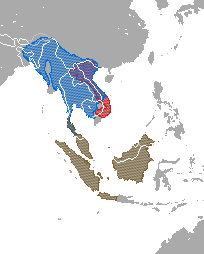Nycticebus
| Slow lorises | |
|---|---|
 |
|
| Sunda slow loris Nycticebus coucang | |
| Scientific classification | |
| Kingdom: | Animalia |
| Phylum: | Chordata |
| Class: | Mammalia |
| Order: | Primates |
| Suborder: | Strepsirrhini |
| Family: | Lorisidae |
| Subfamily: | Lorinae |
| Genus: |
Nycticebus É. Geoffroy, 1812 |
| Type species | |
|
Lori bengalensis Lacépède, 1800 |
|
| Species | |
|
|
 |
|
| Distribution of Nycticebus red = N. pygmaeus; blue = N. bengalensis; brown = N. bancanus, N. borneanus, N. coucang, N. javanicus, N. kayan & N. menagensis | |
| Synonyms | |
|
|
Slow lorises are a group of several species of nocturnal strepsirrhine primates that make up the genus Nycticebus. Found in Southeast Asia and bordering areas, they range from Bangladesh and Northeast India in the west to the Sulu Archipelago in the Philippines in the east, and from Yunnan province in China in the north to the island of Java in the south. Although many previous classifications recognized as few as a single all-inclusive species, there are now at least eight that are considered valid: the Sunda slow loris (N. coucang), Bengal slow loris (N. bengalensis), pygmy slow loris (N. pygmaeus), Javan slow loris (N. javanicus), Philippine slow loris (N. menagensis), Bangka slow loris (N. bancanus), Bornean slow loris (N. borneanus), and Kayan River slow loris (N. kayan). The group's closest relatives are the slender lorises of southern India and Sri Lanka. Their next closest relatives are the African lorisids, the pottos, false pottos, and angwantibos. They are less closely related to the remaining lorisoids (the various types of galago), and more distantly to the lemurs of Madagascar. Their evolutionary history is uncertain since their fossil record is patchy and molecular clock studies have given inconsistent results.
...
Wikipedia
